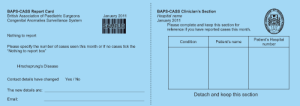Surveillance Methodology
PLEASE NOTE: The BAPS-CASS programme of work has now closed. The team at the National Perinatal Epidemiology Unit are now running the Children's Surgery Outcome Reporting Programme (CSOR). To find out more about CSOR please visit: https://npeu-webpublic.ndph.ox.ac.uk/csor
This prospective monthly case collection system uses the model of the UK Obstetric Surveillance System (UKOSS), a recently established joint initiative between the Royal College of Obstetricians and Gynaecologists (RCOG) and the National Perinatal Epidemiology Unit (NPEU), based at the University of Oxford.
Each month a nominated representative in each paediatric surgical unit in the UK is sent a report card with a list of conditions (figure) currently under surveillance. They are asked to complete a simple tick box indicating if any cases have occurred in the previous month, or if none, to return the card indicating a nil return. This is similar to the monthly reporting card system used successfully by the British Paediatric Surveillance Unit (BPSU) for over 20 years.
On receiving a case report (return of the monthly card mailing), the BAPS-CASS team dispatches a simple data collection form to collect more detailed information about the case. The data collection forms are developed individually for each condition (see appropriate web page). The data collection form seeks confirmation of the appropriate case definition and additional information on management and outcomes according to the protocol relating to each condition. BAPS-CASS collects anonymised information only. Data is collated at the National Perinatal Epidemiology Unit and analysed by the team responsible for each individual study.
Figure: BAPS report card


